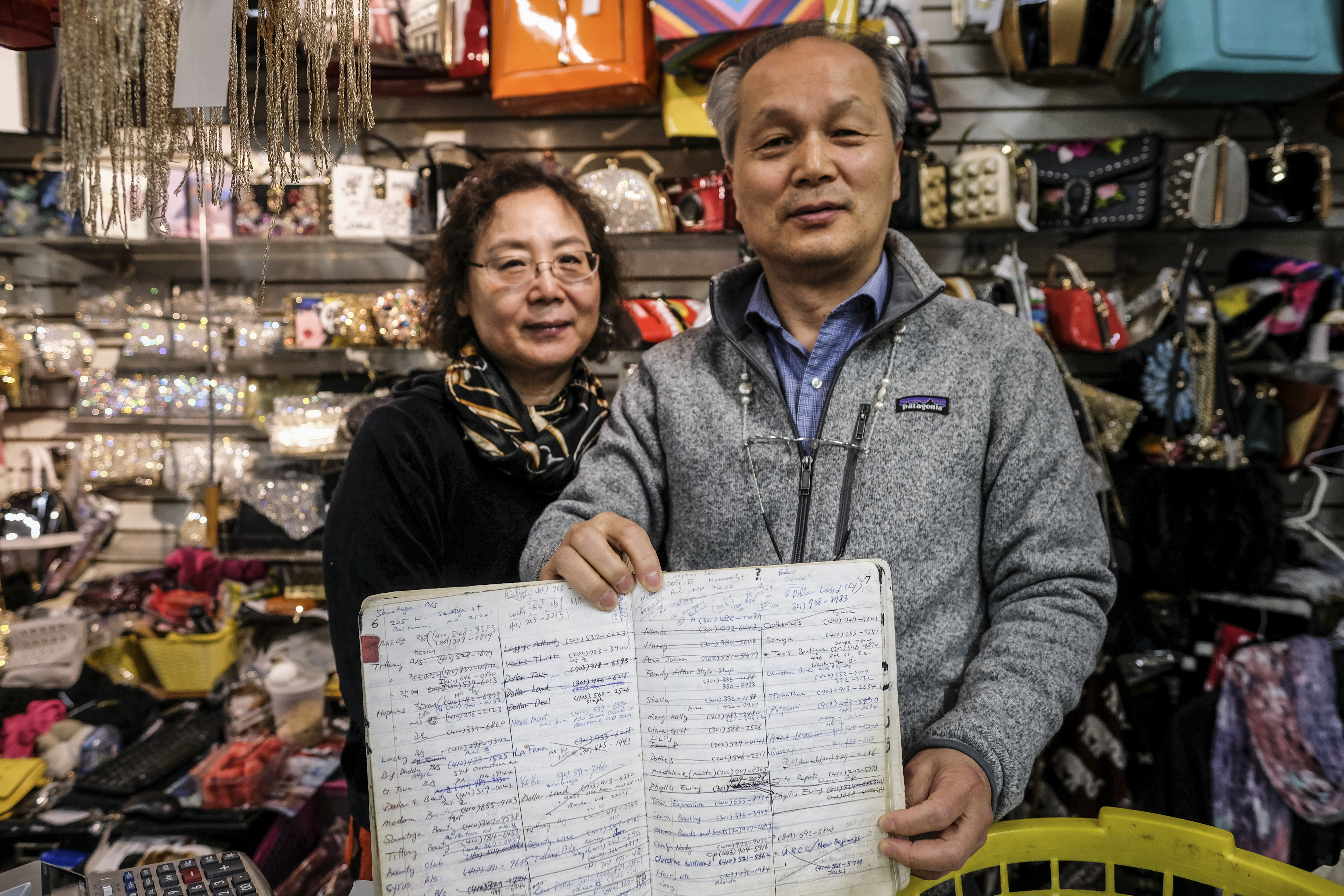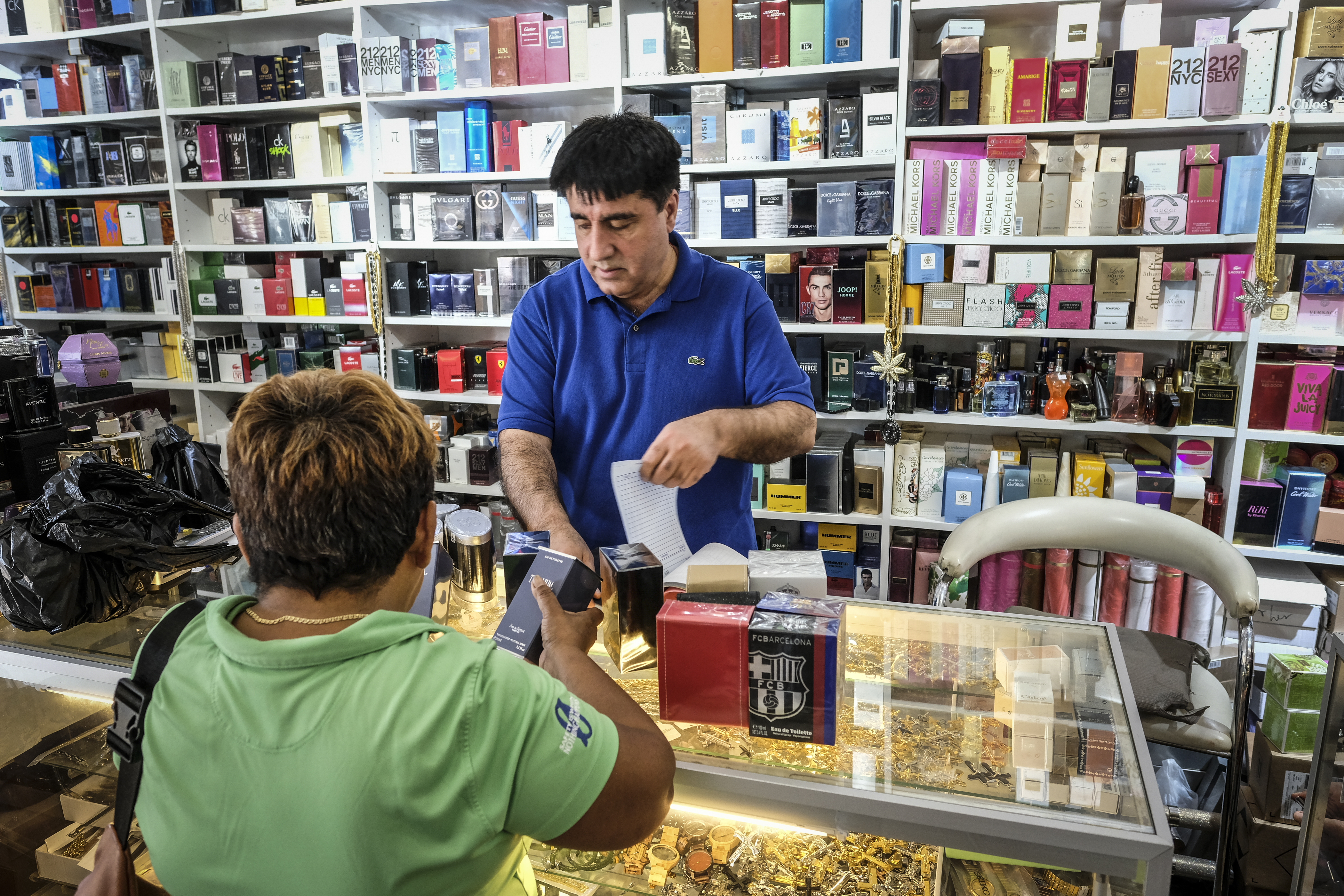
D.C.’s Florida Avenue Market is alive, an ecosystem unto itself. Boxes of produce exit trucks and enter warehouses, where they await chefs with discerning eyes. An electric saw rends chickens in two. People shop for Mother’s Day gifts, perfume, kitchen supplies, watches, wholesale goods, and clothes. Construction workers put the finishing touches on trendy reimaginations of industrial spaces, and customers circle the market, looking for parking. Its sounds and sights and smells are unique to it.

The market—a longtime home to wholesalers, produce vendors, and tofu makers—won’t look like this for long. It shares and increasingly cedes its space to high-end restaurants, boutiques, and apartment buildings. Most veterans City Paper spoke with expect to leave within a year or two, though some will stay.
The market, which surrounds the newer Union Market, is trapped in the past and present. The businesses here are rooted in long family histories and pre-Amazon business models, but the dramas playing out behind these graffitied walls are painfully modern. The city is changing. This is what the market looks like today. Tomorrow it will be different.

Forus Wholesale Company sits between a bank and Masseria—an Italian restaurant with a medley of tasting menus starting at $98. Stairs bring you up and into its warehouse, where displays of clothing and jewelry cake the floors and snake up the walls. Michelle Obama’s smiling face adorns shiny handbags. Jae and his wife, Angela, who own Forus, have been at the market for 27 years. They got their start in the wholesale game across town, on 14th Street NW, but business wasn’t good. Their landlord kept coming to their store, asking how business was, trying to help. “And he told me, ‘OK anytime you want to leave, you find a better place, you can leave. I’ll let you go.’”

This warehouse was that place—with plenty of parking, a well established wholesale business, and easy access for Virginia- and Maryland-based customers. “My customer told me, ‘You better go to the market.’”

A customer found their current place, and they made it home. Jae says he was the first one in the market to sell “church hats.” Now their lease has expired and they’re month to month. They expect to move out in a year or two, departing with whatever merchandise they don’t sell and memories of their customers in tow. They’ve attended their weddings, funerals, and birthday parties, paid visits to hospitals. Their customers have been “like family” Angela says as Jae produces a notebook listing their names and phone numbers. Many are crossed out, retired or dead. “We miss them,” he says.


Suleman Hussain is a trusting guy. It’s gotten him in trouble before: “We lost a couple thousand dollars by trusting somebody, gave them the merchandise and they were going to come back and so … we lost a couple thousand. It’s like, over 20 thousand.” But the trust he’s placed in his customers has paid off. He started selling bedsheets and towels in the winter of 2008 in the unheated Trade Linker space, but his customers weren’t into it. “They were advising us what to bring and what not to bring and so we followed what they told us so that’s how we grew up.” Now they sell leggings, tank tops, and “weed hats.”

His trust has paid off in other ways, too. “We had a customer a couple days ago and it’s the first time she came to our shop. Something we sell is $10 and she says, ‘I have $5,’ she says ‘I’ll bring it back.’ I don’t know her and she just came today, she said, ‘I owe you the money from last week.’ She literally was going to hug me because of the trust we have.” He says he’s happy to have helped so many of them. “They come here shivering, they have nothing to wear so they get socks and they feel so happy after they leave from here.”
Trade Linker will move out, maybe to Hyattsville, where a number of wholesalers are making a go of it. Some of their customers will follow them, but most won’t, Hussain says. They’ll start over again, building trust and clientele just like they did in 2008.
“It’s like it’s a baby and I start crawling and I grew up, start walking and then something happen and then start all over again.”


Bob Elliott makes a beeline for the plum tomatoes, but grabs some vine-ripened ones instead. “I really like vine-ripened tomato. I think that it delivers the best flavor,” the semi-retired executive chef says. “When I was in the business this was an everyday occurrence, especially before they started building up different things, you had more opportunity to buy fresh and from the market.” He came here during junior high—the farmers market had better lunch than the cafeteria.

But now, like the market itself, he’s straddling the past and future. He just gave the last of his businesses to an employee, and he’s only here to help the new boss out. The new guy has a catered event this weekend, and Elliott wants to show him how he does things. “Chances are, he’s going to improve on that.”
The change doesn’t bother him. “Sometimes communities change for the better and sometimes they change for the worse. I think this one is changing for the better.”
He’s on Morse Street NE now, heading back to his car. His former employee is having trouble with his refrigerator, and Elliott wants to teach him how to take care of his equipment. They’ll use a soft brush and chemical solution he bought to clean the evaporator unit. He got those at the market too.


Shah Wazir remembers two Israeli tourists, a couple, who somehow happened on the market. They had just flown in, and the husband had been drinking in the airport. Seeing the market, the wife thought he had somehow gotten them on the wrong flight. “She asked me ‘Is it true this is Washington?’” he says. He pointed them toward the Mall so they could see the proof.
Wazir wound up in this business by coincidence. He saw people selling perfume and watches on a visit to New York, and brought the business model to D.C. Now he runs two shops in the market. On the day City Paper found him, he was doing good business selling watch sets for Mother’s Day.
Wazir expects to leave in a few years, and reflects on his time here. “I will write one book,” he says.


Fatima Toor exits a halal butcher and walks south on 5th Street NE, hoping that the market won’t change too much. The butcher has been “a savior” to her. “I was Googling stuff and noticed that most halal markets are actually in Virginia and I don’t have a car. I would take the Metro all the way to Fairfax, then take an Uber, then get the halal meat, and then come all the way back that way. And it was a lot.” A friend eventually introduced her to this place. “And it was wonderful, and it’s still great that I have it. I just got halal marshmallows for iftar.”
The juxtaposition of the old and new throws her.
“I’m not sure if they really understand the diversity of this city and the different types of people that live here and equity in D.C. And like how when you start only having one type of stores and markets for people who have money you aren’t considering and thinking about other groups of people and other incomes in the city that need things. Halal meat is an essential need for me. And if this goes away I don’t know what I’m going to do. And so they need to think about that consideration of other people, not just one type of group of people. Like rich, upscale, well off people.”



